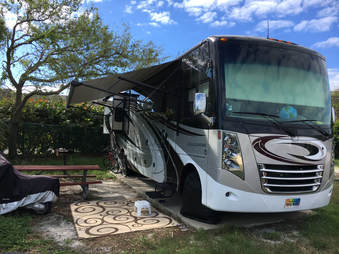 We love to travel, both abroad and within the USA. Quite frankly, we can’t believe how much we have gotten to travel and see this year, and there’s still two months left in the year, with a Thanksgiving trip to Colombia and a Christmas cruise planned. When we lived in the house, it always seemed that we returned from a long foreign trip to something that needed repairs, usually the AC. We had a lot of trepidations about leaving the RV for two weeks. Will it be safe? Will it be painfully obvious that we’re not there, making it a target for break ins? We’re on the beach, will a wicked storm or hurricane hit the area while we’re away? We didn’t realize it when we checked in to this campground, but they have a rule that no campsite or RV may be left unattended overnight. Opps! Will they tow it? They mentioned that they may be changing the gate code soon. Will it get changed while we are away, making it difficult to get in and forcing us to explain that we’ve been gone for two weeks? We got home at 2am. Code at the gate worked fine. RV still there. No notices on the door. All is well… or so we thought. The temp went down to 49 degrees that night, so we opened the windows and went straight to bed. It wasn’t until the morning that we realized some things were amiss. There was no power going to the microwave, refrigerator, heater, or any of the outlets. I think Al made about a dozen calls or more in two days time trying to figure out how to fix this. It would be the first time using the extended warranty insurance, and we weren’t certain about the process. But the biggest frustration was that every repair shop was completely booked for the next 5 weeks, and independent repair techs were too overwhelmed with work to even answer their phones. WTF? Why is everything so booked? Seems that many people received damage to their rigs during the hurricanes. But you would think a full timer could get in ahead of people who use their RV 2 months a year for vacation. Calls to the Thor manufacturer gave us some guidance that it may be the automatic transfer switch based on the symptoms. We were able to get the fridge to work off the batteries when we turned on the inverter, but still minimal or no power to most everything else. We finally got a highly recommended repair tech on the phone who offered us some suggestions (he was also too busy to come out and help). Following his guidance, Al turned off the inverter and the unplugged us from shore power. He placed the RV in “Store” mode, and flipped all the circuit breakers a few times. He then flipped the switch on the shore power external box a few times before plugging it back in. Abracadabra! The RV came back to life! It took some time for the power to reach all the outlets, but they finally did. In the house, Al tended to stress more about repairs and the cost. In the RV, he has a very different mindset. He is willing to learn and understand the intricacies of the unit. It is so very different than maintaining a house, and I still find it a bit daunting, but Al has thoroughly embraced it. I have nightmares that I have to unhook the unit, get the dolly hooked up, load the car, and drive cross country with it all on my own! We are also learning that critters find every nook and cranny to get in here. While Al was on his fourth or fifth call for repairs, I started unpacking and putting stuff away when I came across a large ant colony that had made a nest in my wardrobe closet. It looked like Aliens Covenant happened in there while we were away. Sigh. Truth be told, it could have been worse. Patience is needed, and a willingness to learn. It helps when you are truly embracing the lifestyle. Be willing to get hands on, and do some research into repairs. The freedom outweighs the challenges.
1 Comment
|
AuthorSometimes Honey (Al), and sometime Babe (Elizabeth). Archives
February 2021
Categories |